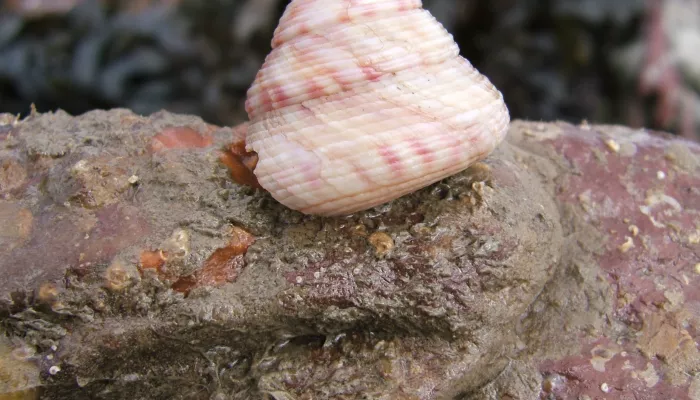Keyhole limpet
Found on rocky shores and seabeds, the Keyhole limpet gets its name from the little hole at the tip of its shell.

Way more colourful and exciting than our land slugs and snails! Visit the world of sea slugs and snails, learn about them and how to identify them in our species explorer.
Found on rocky shores and seabeds, the Keyhole limpet gets its name from the little hole at the tip of its shell.
If you’ve ever been rockpooling, you’ve probably seen a limpet or two! Their cone-shaped shells clamp onto rocks until the tide comes in, at which point they become active. Limpets move around eating algae using their tough tongue.
The thick topshell is a common sight on rocky shores in Wales and South West England.
These little sea snails are found amongst the seaweed on rocky shores around much of the UK. They come in lots of different colours, from bright yellow to chequered brown!
Edible periwinkles are a common sight when rockpooling and can be found in huge numbers on the shore.
These non-native limpets arrived from America in the 19th century and are now widespread in the UK. They form stacks and have a specially adapted shell which, when flipped upside down, looks like a slipper!
This small sea snail is easily identifiable by the 3 brown spots on the top of its shell.
This sea snail is abundant on rocky shores around the UK. It is an active predator, feasting on mussels and barnacles before retreating to crevices to rest.
This jagged-shelled sea snail is normally found near its favourite food - oysters!
The common whelk is the largest sea snail found in UK seas, though you're more likely to find the dry balls of empty whelk egg capsules washed up in strandlines.
Nudibranchs, also known as sea slugs, are much like their land-based relatives that you may spot in your garden. But, unlike your regular garden slug, the nudibranch can incorporate the stinging cells from their prey into their own bodies – giving them a…
The kingfisher blue stripes of a blue-rayed limpet are a magical sight whilst rockpooling - you'll need to go on a very low tide though as their favourite home is on kelp.
The beautiful pink and white bands of a Painted topshell make it easy to see where this little sea snail got its name!
A small colourful sea slug that can be found grazing on sea mats on the rocky shore and beyond the low water mark.
The sea hare looks like a sea slug – but in fact has an internal shell. They can be up to 20cm long but are usually much shorter.
A large colourful sea slug found on rocky shores around the UK.
Found on rocky shores around the UK, Chitons are a kind of mollusc identifiable by their characteristic coat-of-mail shells.
A small, but feisty scavenger, this carnivorous sea snail does not let anything go to waste!
One of the UK’s smallest and most delicate sea snails and an absolute favourite find for avid shell collectors when washed upon the shore empty!
This large sea slug is anything but dull!
This brilliant red and white sea slug would make the perfect nudibranch for a Christmas card image or perhaps a football team mascot!
Despite its dazzling colouration, this fabulous nudibranch can be easily missed, due to its small size!
Also known as the flat topshell, these are one of the most common and colourful sea snails you are likely to see when out on a rockpool safari!
This remarkable creature shows nature’s fantastic complexity!
The UK is home to so many incredible sea slugs, like this elegant nudibranch.